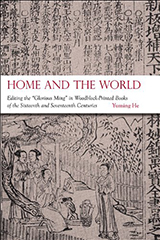By Yuming He
Harvard University Press, $39.95, 343 pages
The rise of literacy can be traced in conjunction with the rise of book production, and reading. In many cultures the concept of the book went through many changes, and what was popular in one era began to be seen as worthless and barbarian in another. This is so with the Ming into the Qing dynasties in China. While the Ming books explored the known world the Qing dynasty blasted the Ming books as worthless and useless for scholars since they did not follow the Qing convention.
In this book we get to explore the world of Ming book-making, and how it influenced learning, society, and culture. How books, and standards, changed over time; that it was not a static world. The ideas and concepts of literature and knowledge were changing rapidly, and people had to change with it.
While this book is written for an academic audience, and a fairly specific one at that, the average reader will still enjoy this book and will be able to follow it since the writing does not get technical or bogged down. The author does well to bring to life this largely forgotten part of Chinese history.
Reviewed by Kevin Winter
[amazon text=Buy On Amazon&asin=0674066804][amazon text=Buy On Amazon&template=carousel&asin=0674066804]

